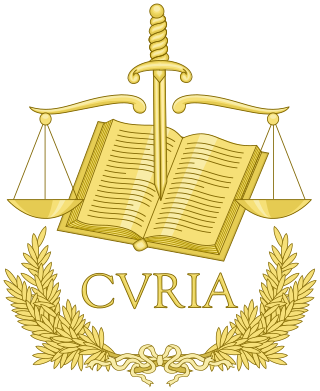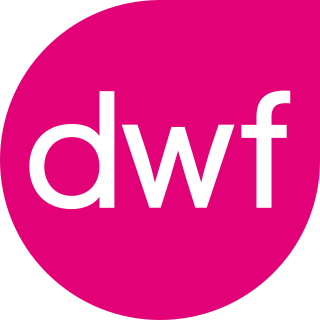
The European Union (EU) is a supranational political and economic union of 27 member states that are located primarily in Europe. The union has a total area of 4,233,255 km2 (1,634,469 sq mi) and an estimated total population of nearly 447 million. The EU has often been described as a sui generis political entity combining the characteristics of both a federation and a confederation.

The General Court, informally known as the European General Court (EGC), is a constituent court of the Court of Justice of the European Union. It hears actions taken against the institutions of the European Union by individuals and member states, although certain matters are reserved for the European Court of Justice. Decisions of the General Court can be appealed to the Court of Justice, but only on a point of law. Prior to the coming into force of the Lisbon Treaty on 1 December 2009, it was known as the Court of First Instance.

European Union competition law is the competition law in use within the European Union. It promotes the maintenance of competition within the European Single Market by regulating anti-competitive conduct by companies to ensure that they do not create cartels and monopolies that would damage the interests of society.
Competition law is the field of law that promotes or seeks to maintain market competition by regulating anti-competitive conduct by companies. Competition law is implemented through public and private enforcement. It is also known as antitrust law, anti-monopoly law, and trade practices law; the act of pushing for antitrust measures or attacking monopolistic companies is commonly known as trust busting.
State aid in the European Union is the name given to a subsidy or any other aid provided by a government that distorts competitions. Under European Union competition law the term has a legal meaning, being any measure that demonstrates any of the characteristics in Article 107 of Treaty on the Functioning of the European Union, in that if it distorts competition or the free market, it is classed by the European Union as being illegal state aid. Measures which fall within the definition of state aid are considered unlawful unless provided under an exemption or notified by the European Commission. In 2019, the EU member states provided state aid corresponding to 0.81% of the bloc's GDP.

The European single market, internal market or common market is a single market comprising the 27 member states of the European Union (EU) as well as – with certain exceptions – Iceland, Liechtenstein, and Norway through the Agreement on the European Economic Area, and Switzerland through sectoral treaties. The single market seeks to guarantee the free movement of goods, capital, services, and people, known collectively as the "four freedoms". This is achieved through common rules and standards that all the EU member states are legally committed to following.

The Directive 96/9/EC of the European Parliament and of the Council of 11 March 1996 on the legal protection of databases is a directive of the European Union in the field of copyright law, made under the internal market provisions of the Treaty of Rome. It harmonises the treatment of databases under copyright law and the sui generis right for the creators of databases which do not qualify for copyright.
Trade mark law of the European Union is governed by European Union law together with national law within those countries which are also member states of the European Union. Trade marks may be registered within individual countries, or across the whole of the EU. In the case of a European Trademark is granted a unitary character that applies protection for that mark across the whole of the EU with certain exceptions. Exceptions include but not limited to: specific language conflicts in a particular reason as well as the case where there was a previously granted national trademark that would conflict in the case of a given EUTM.

Markets in Financial Instruments Directive 2014 commonly known as MiFID 2, is a legal act of the European Union. Together with Regulation (EU) No 600/2014 it provides a legal framework for securities markets, investment intermediaries, and trading venues. The directive provides harmonised regulation for investment services of the member states of the European Economic Area — the EU member states plus Iceland, Norway, and Liechtenstein. Its main objectives are to increase competition and investor protection, and level the playing field for market participants in investment services. It repeals Directive 2004/39/EC.

Nippon Chemi-Con Corporation is a Japanese corporation that produces capacitors and other discrete electronic components.

The European Regional Development Fund (ERDF) is one of the European Structural and Investment Funds allocated by the European Union. Its purpose is to transfer money from richer regions, and invest it in the infrastructure and services of underdeveloped regions. This will allow those regions to start attracting private sector investments, and create jobs on their own.

Olswang was an international law firm headquartered in London, United Kingdom and with additional offices in Reading, Brussels, Madrid, Paris, Singapore and, since 2011, Munich. It worked closely with a network of firms across eighty countries. The Lawyer ranked the firm 22nd largest in the UK by worldwide turnover in 2010. That year, the firm had over 600 staff, including 97 partners. David Stewart was the firm's chief executive. On 1 May 2017, Olswang merged with CMS Cameron McKenna and Nabarro to form CMS Nabarro Olswang LLP.
David O'Keeffe is a British lawyer of Irish origin. He is Emeritus Professor of European Law, University of London. He is Senior Counsel of Dentons international law firm. He is a part-time European administrative law judge.
Article 102 of the Treaty on the Functioning of the European Union (TFEU) is aimed at preventing businesses in an industry from abusing their positions by colluding to fix prices or taking action to prevent new businesses from gaining a foothold in the industry. Its core role is the regulation of monopolies, which restrict competition in private industry and produce worse outcomes for consumers and society. It is the second key provision, after Article 101, in European Union (EU) competition law.
United Kingdom competition law is affected by both British and European elements. The Competition Act 1998 and the Enterprise Act 2002 are the most important statutes for cases with a purely national dimension. However, if the effect of a business' conduct would reach across borders, the European Commission has competence to deal with the problems, and exclusively EU law would apply. Even so, the section 60 of the Competition Act 1998 provides that UK rules are to be applied in line with European jurisprudence. Like all competition law, that in the UK has three main tasks.

The Ince Group plc is a United Kingdom-based holding company with a core business in legal services, which is listed on the London Stock Exchange. The company also offers complementary services in accounting, financial services, consulting, and pensions advice. It was previously known as Ince Gordon Dadds LLP, following the acquisition of Ince & Co by Gordon Dadds Group LLP, and rebranded as The Ince Group in August 2019.

The Court of Justice of the European Union (CJEU) is the judicial branch of the European Union (EU). Seated in the Kirchberg quarter of Luxembourg City, Luxembourg, this EU institution consists of two separate courts: the Court of Justice and the General Court. From 2005 to 2016 it also contained the Civil Service Tribunal. It has a sui generis court system, meaning 'of its own kind', and is a supranational institution.

The Juncker Commission was the European Commission in office from 1 November 2014 to 30 November 2019. Its president was Jean-Claude Juncker, who presided over 27 other commissioners. In July 2014, Juncker was officially elected to succeed José Manuel Barroso, who completed his second five-year term in that year.

DWF is a global legal business, headquartered in Manchester, England, with 31 offices across the world. In March 2019, DWF was listed on the London Stock Exchange. With a £366m valuation and offer size of £95m, DWF became the UK's largest listed law firm.

Apple’s EU tax dispute refers to an investigation by the European Commission into tax arrangements between Apple and Ireland, which allowed the company to pay close to zero corporate tax over 10 years.